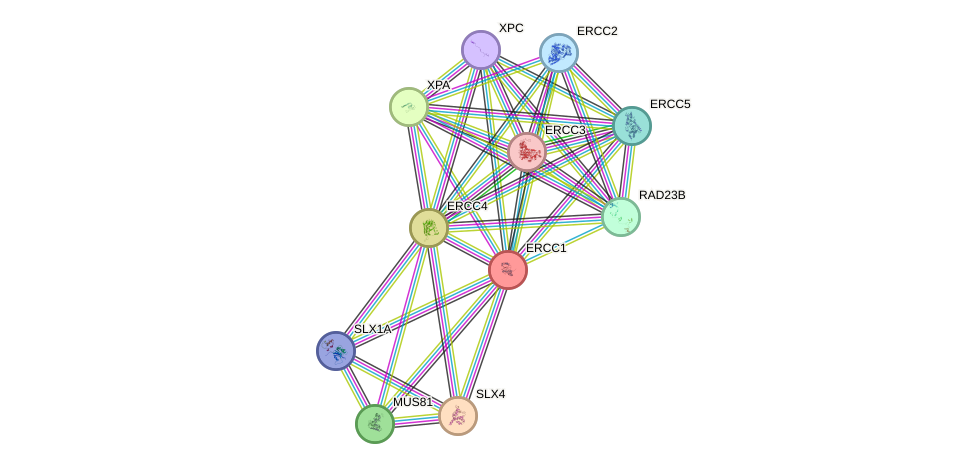GenAge entry for ERCC1 (Homo sapiens)
Entry selected based on evidence directly linking the gene product to ageing in a mammalian model organism
Gene name (HAGRID: 149)
- HGNC symbol
- ERCC1
- Aliases
- RAD10
- Common name
- excision repair cross-complementation group 1
Potential relevance to the human ageing process
- Main reason for selection
- Entry selected based on evidence directly linking the gene product to ageing in a mammalian model organism
- Description
Due to its role in DNA repair in association with the other ERCC proteins [733], it is possible that ERCC1 plays a role in human ageing.
Disruption of ERCC1 in mice results in a very short lifespan with animals dying by about four weeks of age, accompanied by mutation accumulation, decreased cellular proliferation and an increase in apoptotic cells, and signs of premature ageing in the liver and kidney [38]. Hypomorphic ERCC1 mice (hemizygous for a single truncated Ercc1 allele, encoding protein lacking seven amino acids), are also much smaller, have a decreased median and maximum lifespan (though much less severe than the ERCC1 knockout mutants) without any neoplasms observed, and display symptoms of premature aging, including decline in weight of both whole body and various organs, numerous ageing-characteristic histopathological lesions, and immune parameters [3485]. Subjecting ERCC1 knockout mice to dietary restriction triples their median and maximal remaining lifespans and reduces accelerating aging. ERCC1 knockout mice undergoing dietary restriction retain 50% more neurons and maintain full motor function. These findings suggest that dietary restriction preserves genome function by alleviating DNA damage [4361].
In worms, ERCC1-mutants do not display a decreased lifespan. Moreover, ERCC1 deficiency further increases lifespan of daf-2 long-lived mutants [3645]. ERCC1, however, has so far not been associated with any human diseases or with human ageing.
Cytogenetic information
- Cytogenetic band
- 19q13.32
- Location
- 45,413,434 bp to 45,423,562 bp
- Orientation
- Minus strand
Protein information
- Gene Ontology
-
Process: GO:0000710; meiotic mismatch repair
GO:0000720; pyrimidine dimer repair by nucleotide-excision repair
GO:0001302; replicative cell aging
GO:0006281; DNA repair
GO:0006283; transcription-coupled nucleotide-excision repair
GO:0006289; nucleotide-excision repair
GO:0006293; nucleotide-excision repair, preincision complex stabilization
GO:0006295; nucleotide-excision repair, DNA incision, 3'-to lesion
GO:0006296; nucleotide-excision repair, DNA incision, 5'-to lesion
GO:0006302; double-strand break repair
GO:0006310; DNA recombination
And 24 more GO terms Cellular component: GO:0000109; nucleotide-excision repair complex
GO:0000110; nucleotide-excision repair factor 1 complex
GO:0000784; nuclear chromosome, telomeric region
GO:0005654; nucleoplasm
GO:0005669; transcription factor TFIID complex
GO:0005737; cytoplasm
GO:0070522; ERCC4-ERCC1 complex
Show all GO termsFunction: GO:0000014; single-stranded DNA endodeoxyribonuclease activity
GO:0001094; TFIID-class transcription factor binding
GO:0003684; damaged DNA binding
GO:0003697; single-stranded DNA binding
GO:0005515; protein binding
GO:0008022; protein C-terminus binding
GO:0019904; protein domain specific binding
GO:0043566; structure-specific DNA binding
Protein interactions and network
Retrieve sequences for ERCC1
Homologs in model organisms
- Caenorhabditis elegans
- ercc-1
- Danio rerio
- ercc1
- Drosophila melanogaster
- Ercc1
- Mus musculus
- Ercc1
- Rattus norvegicus
- Ercc1
- Schizosaccharomyces pombe
- swi10
In other databases
- GenAge model organism genes
- A homolog of this gene for Mus musculus is present as Ercc1
- LongevityMap
- This gene is present as ERCC1
- CellAge
- This gene is present as ERCC1

